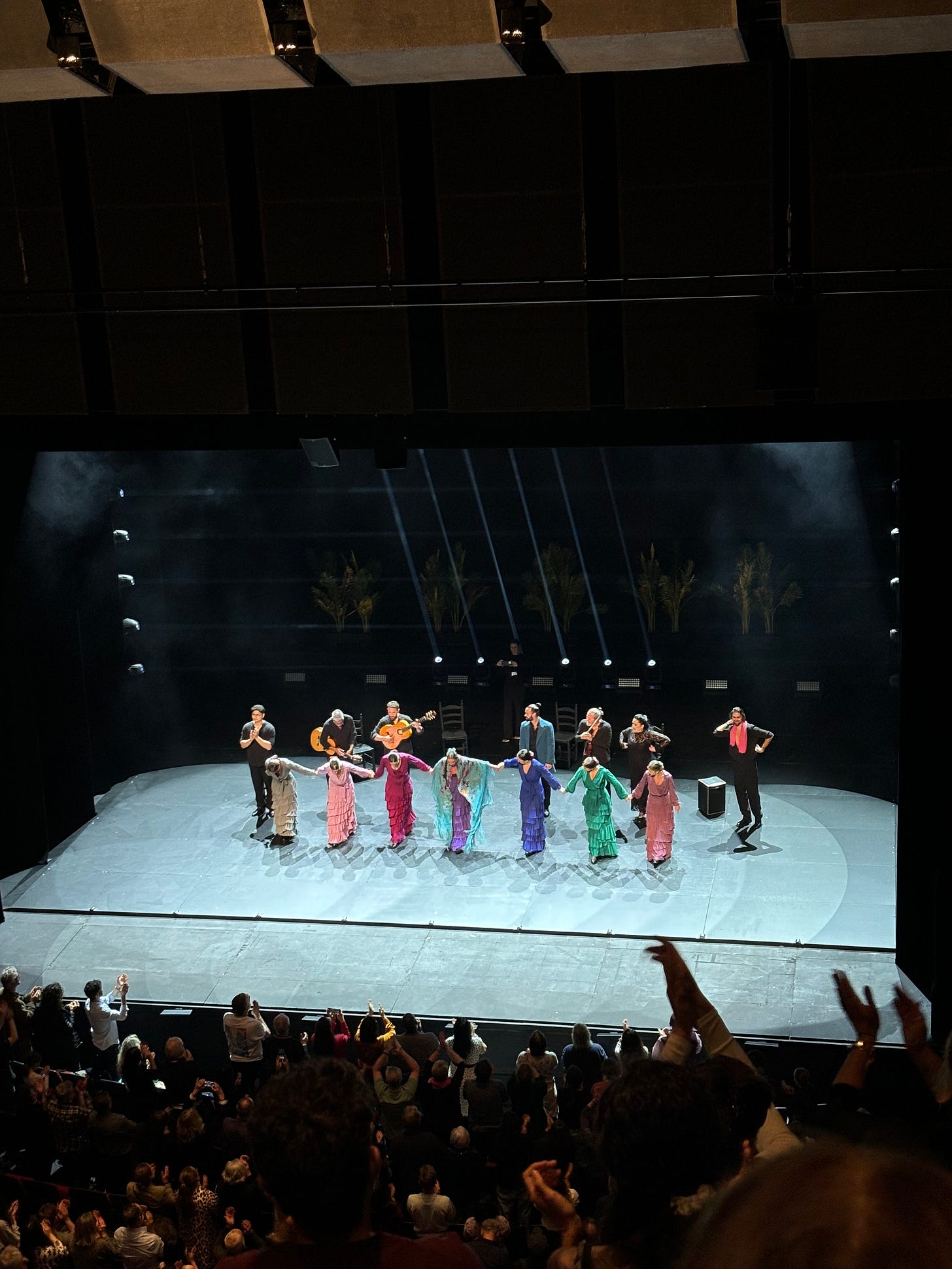“If mujeres [women] are made in God’s image, then we, too, carry these same things inside our bodies: we are co-creators, healers, and providers. The act of giving love through the art made with our hands is an act of deep healing power, and we see this through the myriad of women in the Bible and throughout history who have sewn as a way to enact justice”
— Abuelita Faith, What Women On The Margins Teach Us About Wisdom, Persistence, and Strength, Kat Armas
Last month was Flamenco Festival at Saddler’s wells in London. On one of the days, I went to watch a performance titled Vuela, Ballet Flamenco by Sara Baras. The set was filled with rich storytelling, history and culture. While watching, I couldn’t help but think about how much of a vital role the women have played in each act, from song to dancing and using different tonal registers to express the spectrum of human emotion, it was fascinating to witness.
Voice memo recording from Ballet Flamenco, Sara Baras Vuela at Saddler’s Wells Flamenco Festival May 2025.
Historically, Flamenco was not only banned and faced scrutiny when played to the general public, it also restricted women’s participation. Seeing women today take centre stage felt empowering. It made me think of the lineage of women over time whose act of bravery paved the way for those participating in Flamenco today.
This month’s playlist builds on this theme of women artists and musicians who have fought for their rightful place to practice and express themselves within certain genres and fields. It specifically focuses on Flamenco and Samba, another genre that I have grown to deeply love for its musicality and history, following a trip to Rio De Janeiro last year and starting samba dance lessons. When I made the first version of this playlist back in December, I was inspired by women artists who stir up a strength and inner fortitude that may be characterised as quiet or unobtrusive, but still radiates confidence. I think about artists such as Cleo Sol, Sade, Miriam Makeba, Rosalia, Dorothy Ashby, Sona Jobarteh, Solange, the list goes on.
Both Flamenco and Samba serve as reminders of endurance and the fruits on the other side of contending for our gifts, not just for ourselves but for the libration of those who stand on the fringes of society, those whose voices are silenced or not recognised. It also speaks to the role in women being placed as the protagonists and front runners of storytelling in music, charting their own path.
This Month’s Playlist:
Reading:
Abuelita Faith — Slowly, but surely, I have been making my way through this book over the course of the year. Kat Armas connects her Cuban heritage to the role women played in her understanding of God. From her grandmother’s creativity shining through textile work to Salsa and it’s role in communal gathering. Paired with biblical references of key women figures, the book journeys through the different ways God has used women over time to reveal Himself. It is teaching me that while there is a process of continual surrender that happens when we give our lives to God, He doesn’t require us to shed aspects intrinsic to our being in order to worship Him. We can worship God in our mother tongue, we can appreciate Him while honouring our culture, food and music. Most importantly, we can ask Him to shed light and understanding on our complicated, yet beautiful histories.
**Flamenco is the only dance that lets women age - ballet should take note,** Sara Baras reflects on ageing in dance and how her experience over time has enriched her technique in Flamenco.
Breaking The Circle, Documenting the women of Brazil’s samba circles, Tobias Nathan’s new documentary features the women who make Samba what it is today. Drawing on its Afro-Brazilian roots in Salvador Bahia and the first form, Samba de Roda.
Sounds From Above is a monthly segment by artist and researcher, Alice Otieno. The series explores how God speaks to us through music, and more broadly, sound. It aims to present the expansiveness of the medium; as something that can be heard, felt, experienced and embodied, drawing us into a deeper relationship with God, ourselves, and world around us in unexpected ways.







